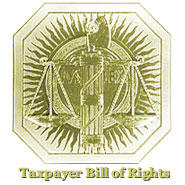|
 On
November 10, 1988, President Reagan signed into law a bill specifying
the rights of all taxpayers in dealings with the Internal Revenue
Service. This law specifies your rights as a taxpayer as follows: On
November 10, 1988, President Reagan signed into law a bill specifying
the rights of all taxpayers in dealings with the Internal Revenue
Service. This law specifies your rights as a taxpayer as follows:
1. Requires that the IRS notify all taxpayers
of their rights in writing whenever contact is made. To satisfy
this requirement, the IRS has developed Publication 1, which you
can request a copy or they send one with most communications between
them and the tax payer.
2. Provides that a taxpayer can be represented
by an Enrolled Agent (EA, attorney or CPA. The representative must
have a proper executed power of attorney. If, during the course
of an audit, the taxpayer indicates that they desire to consult
with a representative, the agent must immediately suspend the audit
and allow the taxpayer to obtain counsel.
3. The audit must be conducted at a reasonable
place and time. A taxpayer represented through a valid power of
attorney by a qualified representative need not be present at the
audit unless an administrative summons is issued or the representative
is responsible for unreasonable delay or hindrance.
4. If a taxpayer relies on written advice
from the IRS in preparing a return that is subsequently found to
be erroneous, the IRS is required to abate any portion of any penalty
or addition to tax that is attributable to such advice. Relief is
not available if the taxpayer failed to provide adequate or accurate
information.
5. The IRS Taxpayer Advocate Office (formally
known as the Problem Resolution Office), can issue a taxpayer assistance
order if the taxpayer has suffered or is about to suffer a significant
hardship as a result of IRS action. A taxpayer assistance order
may require specific action such as releasing taxpayer property
upon which a levy has been issued. It may also halt proceedings
to levy bank funds.
6. IRS will generally permit a taxpayer
who is unable to pay his full tax liability to make installment
payments. The agreement is to remain in effect for the entire term
unless:
- the taxpayer fails
to pay an installment when due,
- the taxpayer provided
inaccurate information,
- the taxpayer fails
to pay other tax liabilities when due,
- the taxpayer fails
to respond to IRS requests for updated financial information,
or
- the IRS determines
that the collection of tax to which an agreement relates is in
jeopardy. The IRS may modify or terminate an agreement if the
financial condition of the taxpayer has changed significantly.
7. A taxpayer's personal residence is only
subject to levy in cases of jeopardy or with
the consent of the District Director or his Assistant.
8. Banks will be required to hold levied
funds, for 21 days before remitting them to the
IRS.
9. The IRS must release a levy on property
if:
- the liability for which the
levy was made is satisfied,
- the IRS determines the release
will facilitate the collection of the liability,
- an installment payment agreement
has been executed with respect to the liability,
- IRS has determined that the
levy is creating an economic hardship due to the taxpayer's financial
condition, or
- the fair market value of the
property exceeds the liability and partial release would not hinder
collection of the tax and related costs owed to the IRS.
There has been some other changes, that strengthen's
the Taxpayer Bill of Rights to the extent that the taxpayer can
appeal some actions by the IRS to the US Tax Court for a hearing
and final determination. These changes can be discussed with a practitioner
of tax law, such as an Enrolled Agent or attorney. Some of these
changes are complex and to lenghy to discuss here.
We just wanted to bring you the highlights of
the Taxpayer Bill of Rights, and each taxpayer's situation is different,
if you have any questions, just
ask us.
|



